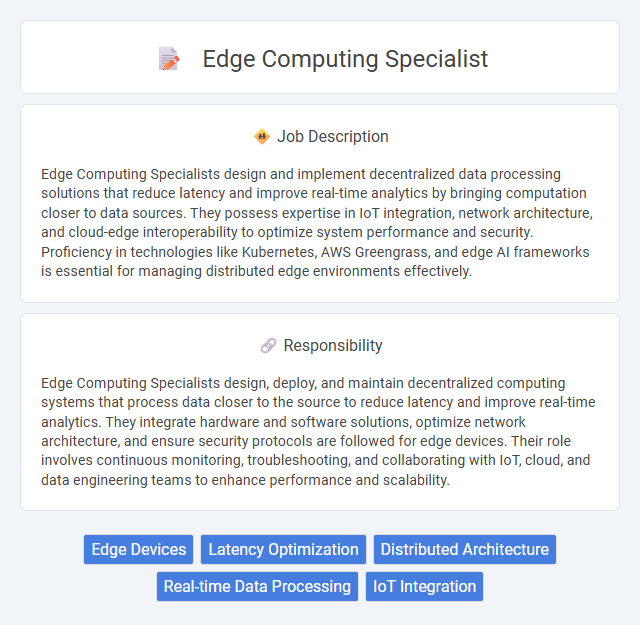
Edge Computing Specialists design and implement decentralized data processing solutions that reduce latency and improve real-time analytics by bringing computation closer to data sources. They possess expertise in IoT integration, network architecture, and cloud-edge interoperability to optimize system performance and security. Proficiency in technologies like Kubernetes, AWS Greengrass, and edge AI frameworks is essential for managing distributed edge environments effectively.
Individuals with a strong interest in distributed computing and real-time data processing would likely find the role of an Edge Computing Specialist suitable. Those who enjoy working with hardware-software integration and solving complex network challenges have a higher probability of thriving in this job. Candidates who prefer isolated or routine tasks may find this position less fitting due to its dynamic and collaborative nature.
Qualification
Edge Computing Specialists require strong expertise in distributed computing, networking protocols, and IoT integration to design and manage edge infrastructure efficiently. Proficiency in programming languages such as Python, C++, and knowledge of containerization tools like Docker and Kubernetes are essential for deploying edge applications. Hands-on experience with real-time data processing, cloud platforms like AWS or Azure, and cybersecurity practices ensures robust and scalable edge computing solutions.
Responsibility
Edge Computing Specialists design, deploy, and maintain decentralized computing systems that process data closer to the source to reduce latency and improve real-time analytics. They integrate hardware and software solutions, optimize network architecture, and ensure security protocols are followed for edge devices. Their role involves continuous monitoring, troubleshooting, and collaborating with IoT, cloud, and data engineering teams to enhance performance and scalability.
Benefit
Edge Computing Specialist roles likely provide significant benefits such as enhancing real-time data processing capabilities by minimizing latency and improving system efficiency. These positions may offer opportunities to work with cutting-edge technology, fostering skill development and career growth in a rapidly evolving field. The demand for specialists is expected to contribute to competitive compensation and job stability.
Challenge
An Edge Computing Specialist likely faces the challenge of optimizing data processing at the network's periphery while ensuring low latency and high reliability. Managing the integration of diverse IoT devices and maintaining security across decentralized systems may present significant complexity. Adapting to rapidly evolving technologies and standards could require continuous learning and flexible problem-solving approaches.
Career Advancement
An Edge Computing Specialist leverages expertise in decentralized network architecture and IoT integration to enhance data processing near the source, accelerating decision-making and reducing latency. Proficiency in cloud platforms, security protocols, and real-time analytics drives innovation and positions professionals for leadership roles in emerging technologies. Career advancement opportunities include senior engineering positions, solution architect roles, and strategic consultancy within high-growth sectors like telecommunications, manufacturing, and smart cities.
Key Terms
Edge Devices
Edge Computing Specialists design, deploy, and manage edge devices to enable real-time data processing close to the source, reducing latency and bandwidth usage. They optimize device performance and security for IoT applications, industrial automation, and smart city infrastructures. Expertise in edge hardware integration, firmware development, and cloud-edge communication protocols is essential for ensuring efficient and scalable edge computing solutions.
Latency Optimization
Edge Computing Specialists enhance system performance by strategically deploying computing resources closer to data sources, significantly reducing latency. They implement real-time data processing techniques and optimize network protocols to minimize delay in data transmission. Mastery of distributed computing frameworks and edge device management enables them to deliver seamless, low-latency user experiences across diverse IoT and cloud-native applications.
Distributed Architecture
Edge Computing Specialists design and implement distributed architectures that process data closer to the source, reducing latency and bandwidth use. They develop scalable edge solutions that integrate with cloud services and IoT devices, ensuring efficient data handling across multiple nodes. Expertise in network protocols, real-time data processing, and security measures is critical for managing decentralized infrastructures.
Real-time Data Processing
Edge Computing Specialists design and implement systems that process real-time data at the network's edge to minimize latency and enhance response times. They optimize data flow by deploying edge devices and integrating IoT sensors for immediate analytics and decision-making. Expertise in distributed computing, low-latency network protocols, and real-time processing frameworks is essential for managing time-sensitive applications across industries.
IoT Integration
An Edge Computing Specialist focusing on IoT integration designs and implements edge solutions that process data closer to IoT devices, reducing latency and bandwidth usage. This role involves optimizing data flow between IoT sensors and cloud platforms, enhancing real-time analytics and system responsiveness. Expertise in deploying edge nodes, managing distributed networks, and securing IoT ecosystems ensures efficient and scalable smart device operations.
 kuljobs.com
kuljobs.com